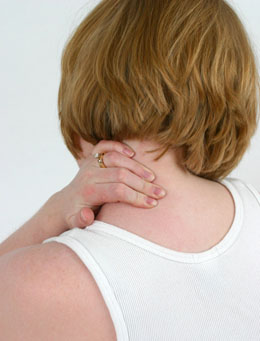Neck nerve damage is painful and cause a lot of discomfort to the patient suffering from it. Read this article to gather more information related to the symptoms and treatment.

The nerves present in the neck area are known as cervical nerves. There are 8 cervical nerves in this region. The neck is susceptible to various forms of injury due to which the cervical nerves may get damaged or strained. Other underlying health conditions like herniated discs and bone spurs can have a damaging effect on these nerves. Identification of symptoms at the initial stage will ensure an early treatment for the problem and thus, prevent any further future complications.
Symptoms
The symptoms mostly depend on the location of the affected nerve. Some of the most commonly observed symptoms are:
Pain : The pain is not just confined to the neck but will also get radiated to other areas like the shoulders, back, arms and sometimes, even to the chest region. Some people get a throbbing, dull pain and others may experience a sharp, shooting pain. It is often accompanied by swelling, stiffness and spasms in the muscles.
Weakness : The damage is bound to weaken the concerned nerve. As a result, weakness is felt in almost all parts of the body. It includes shoulders, elbow joints, wrists or hands, fingers, etc. In some cases, lack of strength may occur in the legs and trunk as well.
Numbness and Tingling : Like in any case, this will also give a sense of numbness in the neck, shoulders and arms. Along with it, one may encounter a tingling or prickling sensation in these areas and the upper back region.
Respiratory Complications : A serious form of damage in the cervical nerve may cause some respiratory complications. This is because some of these nerves control the functioning of the lungs and the diaphragm muscles and facilitate normal breathing. An injury to the nerves may adversely affect the breathing process.
Lack of Control in Excretory Organs : There are nerves that maintain the functions of the bladder and intestinal tract. Any damage in these nerves often leads to loss of bladder control or loss of bowel control. Men who have suffered cervical nerve damage may develop erectile dysfunction.
Loss of Sensation : The brain sends messages to various parts of the body through the spinal nerves. When the nerves fail to carry out this function, one experiences loss of sensation in different parts of the body. This will affect the movements of head, trunk, legs or any other body parts.
Treatment
Those who are suffering from neck nerve damage should suspend all such activities that can strain the neck. For a mild to moderate pain, doctors prescribe painkillers. An unbearable pain is temporarily relieved with the help of narcotic drugs. However, these drugs cannot be used for a long time as there is a risk of addiction. Muscle relaxants are given to get rid of muscle spasms. If these medicines fail to provide any relief from the painful condition, corticosteroid injections are administered. At home, heat or cold compression on the neck can have a soothing effect on the pain.
Physical therapy is highly recommended for these patients as it strengthens the neck muscles which in turn will reduce the pressure on the affected nerve. Massage therapy can improve the blood circulation in the neck area and heal up the nerve tissues fast. Ultrasound treatment is another option where sound waves are applied to the painful part to break down the scarred tissue. If the condition becomes severe, surgery is conducted to repair the damage.
Damage can be prevented to some extent by doing neck exercises regularly. These exercises add strength and flexibility to the neck muscles and reduce the chances of injury. While working for long hours sitting on a desk, you should maintain a good posture and take frequent breaks in order to minimize pressure on the neck.


 The nerves present in the neck area are known as cervical nerves. There are 8 cervical nerves in this region. The neck is susceptible to various forms of injury due to which the cervical nerves may get damaged or strained. Other underlying health conditions like herniated discs and bone spurs can have a damaging effect on these nerves. Identification of symptoms at the initial stage will ensure an early treatment for the problem and thus, prevent any further future complications.
The nerves present in the neck area are known as cervical nerves. There are 8 cervical nerves in this region. The neck is susceptible to various forms of injury due to which the cervical nerves may get damaged or strained. Other underlying health conditions like herniated discs and bone spurs can have a damaging effect on these nerves. Identification of symptoms at the initial stage will ensure an early treatment for the problem and thus, prevent any further future complications.